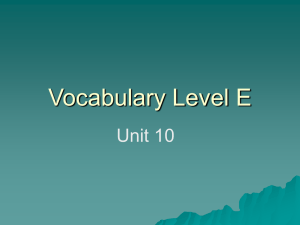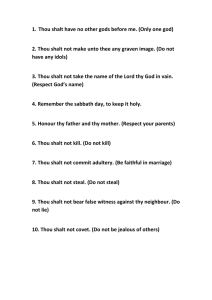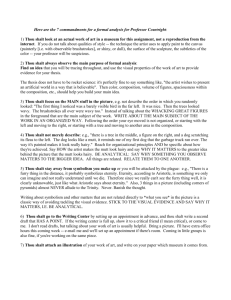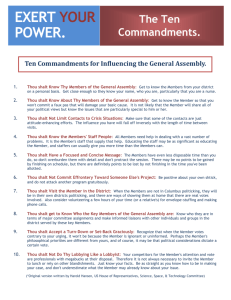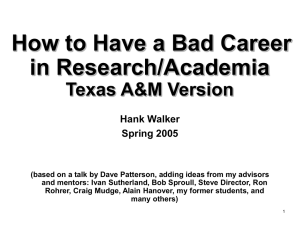How to Have a Bad Career in Research/Academia Professor David A. Patterson
advertisement
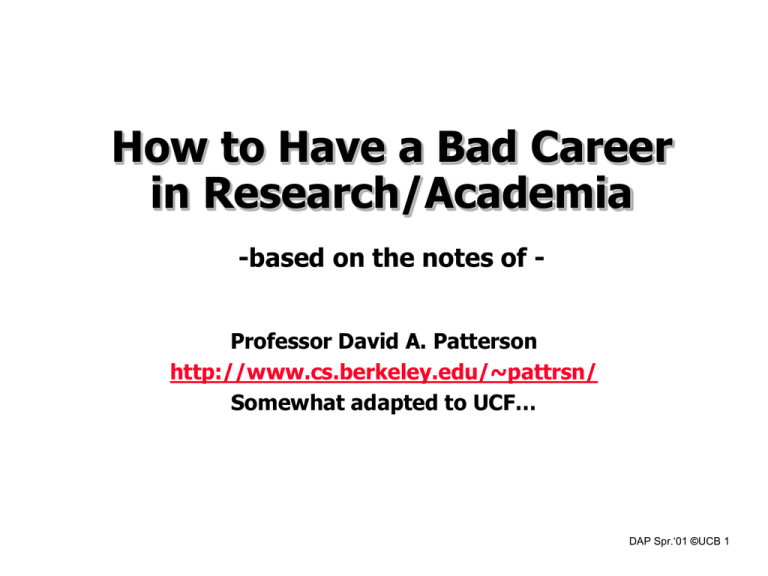
How to Have a Bad Career in Research/Academia -based on the notes of Professor David A. Patterson http://www.cs.berkeley.edu/~pattrsn/ Somewhat adapted to UCF… DAP Spr.‘01 ©UCB 1 Outline • Part I: Key Advice for a Bad Career while a Grad Student • Part II: Key Advice on Alternatives to a Bad Graduate Career • Part III: Key Advice for a Bad Career, Post PhD • Part IV: Key Advice on Alternatives to a Bad Career, Post PhD • Topics covered in parts III and IV – – – – – – Selecting a Problem Picking a Solution Performing the Research Evaluating the Results Communicating Results Transferringlogy Part I: How to Have a Bad Graduate Career • Concentrate on getting good grades: – postpone research involvement: might lower GPA • Minimize number and flavors of courses – Why take advantage of the excellent grad courses offered by the department? – May affect GPA • Don’t trust your advisor – Advisor is only interested in his or her own career, not your’s – Advisor may try to mentor you, use up time, interfering with GPA • Only work the number of hours per week you are paid! – Don’t let master class exploit the workers! Part I: How to Have a Bad Graduate Career • Concentrate on graduating as fast as possible – Winner is first in class to PhD – People only care about that you have a PhD and your GPA, not on what you know » Nirvana: graduating in 3.5 years with a 4.0 GPA! – Don’t spend a summer in industry: takes longer » How could industry experience help with selecting PhD topic? – Don’t work on large projects: takes longer » Have to talk to others, have to learn different areas » Synchronization overhead of multiple people – Don’t do a systems PhD: takes longer • Don’t go to conferences – It costs money and takes time; you’ll have plenty of time to learn the field after graduating • Don’t waste time polishing writing or talks – Again, that takes time Part II: Alternatives to a Bad Graduate Career • Concentrate on getting good grades? – Reality: need to maintain reasonable grades – What matters on graduation is letters of recommendation from 3-4 faculty/PhDs who have known you for 5+ years (including 1 outside of UCF: see summer jobs) • Minimize number and flavors of courses? – Your last chance to be exposed to new ideas before have to learn them on your own (re: queueing theory and me) – Get a real outside minor from a campus with great departments in all fields; e.g., Management of Technology certificate • Don’t trust your advisor? – Primary attraction of campus vs. research lab is getting to work with grad students – Faculty career is judged in large part by success of his or her students – try taking advice of advisor? Part II: Alternatives to a Bad Graduate Career • Concentrate on graduating as fast as possible? – Your last chance to learn; most learning will be outside the classroom – Considered newly “minted” when finish PhD » Judged on year of PhD vs. year of birth » To a person in their 40s or 50s, 1 or 2 more years is roundoff error (27 = 29) • Don’t go to conferences? – Chance to see firsthand what the field is like, where its going – There are student rates, you can share a room – Talk to people in the field in the halls – If your faculty advisor won’t pay, then pay it yourself; almost always offer student rates, can often share rooms » Prof. Landay paid his own way to conferences while grad student • Don’t waste time polishing writing or talks? – In the marketplace of ideas, the more polish the more likely people will pay attention to your ideas – Practice presentation AND answering tough questions Part II: Alternatives to a Bad Graduate Career • Only work the number of hours per week you are paid? – – – – – Campus Faculty average is 65-70 hours/work; ECE higher Students should be in that range Organize each day: when most alert? nap? exercise? sleep? When/how often/how long: write, read, program, email? To do lists: daily, weekly, semester • Industrial Experience? – 1st or 2nd summer get work experience, or 1 semester off • Sutherland’s advice (Father of Computer Graphics) – Be bold; Take chances on hard topics – Technology and Courage see link on the course page • Advice from a very successful recent student; Remzi Arpaci – – – – Great ideas, did lots of papers, well thought of I asked: Why do you think you did so well? He said I gave him advice the first week he arrived I asked: What did I say? Part II: How to be a Success in Graduate School • 1) “Swim or Sink” – “Success is determined by me (student) primarily” – Faculty will set up the opportunity, but its up to me leverage it • 2) “Read/learn on your own” – “Related to 1), I think you told me this as you handed me a stack of about 20 papers” • 3) “Teach your advisor” – “I really liked this concept; go out and learn about something and then teach the professor” – Fast moving field, don’t expect professor to be at forefront everywhere Outline • Part I: Key Advice for a Bad Career while a Grad Student • Part II: Key Advice on Alternatives to a Bad Graduate Career • Part III: Key Advice for a Bad Career, Post PhD • Part IV: Key Advice on Alternatives to a Bad Career, Post PhD • Topics covered in parts III and IV – – – – – – Selecting a Problem Picking a Solution Performing the Research Evaluating the Results Communicating Results Transferring Technology Bad Career Move #1: Be THE leading expert • Invent a new field! – Make sure its slightly different • Be the real Lone Ranger: Don’t work with others – – – – – – No ambiguity in credit Adopt the Prima Donna personality / Research Horizons Never define success Avoid Payoffs of less than 20 years Stick to one topic for whole career Even if technology appears to leave you behind, stand by your problem Announcing a New Operating System Field: “Disability Based Systems” • Computer Security Insight: capability based addressing almost right • Idea: Create list of things that process CANNOT do! • Key Question: should you store disabilities with each user or with the objects they can’t access? • Other topics: encrypted disabilities, disability-based addressing • Start a new sequence of courses Announcing yet another New O.S. Field: “Omni-Femtokernels” • “Femto” – microkernels, only more so • “Omni” – omnipresent, run femtokernels everywhere: – – – – Operating System Applications VCRs automobiles • Key contribution: employment Bad Career Move #2: Let Complexity Be Your Guide (Confuse Thine Enemies) • Best compliment: “Its so complicated, I can’t understand the ideas” – If no one understands, how can they contradict your claim? • It’s easier to be complicated – Also: to publish it must be different; N+1st incremental change • If it were not unsimple then how could distinguished colleagues in departments around the world be positively appreciative of both your extraordinary skills and talents Bad Career Move #3: Never be Proven Wrong • Avoid Implementing • Avoid Quantitative Experiments – If you’ve got good intuition, who needs experiments? – Why give grist for critics’ mill? – Takes too long to measure • Avoid Benchmarks • Projects whose payoff is >= 20 years gives you 19 safe years Bad Career Move #4: Use the Computer Scientific Method Obsolete Scientific Method • Hypothesis • Sequence of experiments • Change 1 parameter/exp. • Prove/Disprove Hypothesis • Document for others to reproduce results Computer Scientific Method • Hunch • 1 experiment & change all parameters • Discard if doesn’t support hunch • Why waste time? We know this Bad Career Move #5: Don’t be Distracted by Others (Avoid Feedback) • Always dominate conversations: Silence is ignorance – Corollary: Loud is smart • Don’t read • Don’t be tainted by interaction with users, industry • Reviews – If it's simple and obvious in retrospect => Reject – Quantitative results don't matter if they just show you what you already know => Reject – Everything else => Reject Bad Career Move #6: Publishing Journal Papers IS Technology Transfer • Target Archival Journals: the Coin of the Academic Realm – It takes 2 to 3 years from submission to publication=>timeless • As the leading scientist, your job is to publish in journals not your job to make you the ideas palatable; wastes valuable research time – Travel time, having to interact with others, serve on program committees, ... Bad Career Move #7: Writing Tactics for a Bad Career • Papers: It’s Quantity, not Quality – Personal Success = Length of Publication List – “The LPU (Least Publishable Unit) is Good for You” 1 idea 4 journal papers 16 extended abstracts 64 technical reports “Publication pyramid of success” • Student productivity = number of papers – Number of students: big is beautiful – Never ask students to implement: reduces papers • Legally change your name to Aaaanderson 5 Writing Commandments for a Bad Career I. II. III. IV. V. Thou shalt not define terms, nor explain anything. Thou shalt replace “will do” with “have done”. Thou shalt not mention drawbacks to your approach. Thou shalt not reference any papers. Thou shalt publish before implementing. 7 Talk Commandments for a Bad Career I. II. III. IV. V. VI. Thou shalt not illustrate. Thou shalt not covet brevity. Thou shalt not print large. Thou shalt not use color. Thou shalt not skip slides in a long talk. Thou shalt not practice. Following all the commandments • • • • • • • • We describe the philosophy and design of the control flow machine, and present the results of detailed simulations of the performance of a single processing element. Each factor is compared with the measured performance of an advanced von Neumann computer running equivalent code. It is shown that the control flow processor compares favorablylism in the program. We present a denotational semantics for a logic program to construct a control flow for the logic program. The control flow is defined as an algebraic manipulator of idempotent substitutions and it virtually reflects the resolution deductions. We also present a bottom-up compilation of medium grain clusters from a fine grain control flow graph. We compare the basic block and the dependence sets algorithms that partition control flow graphs into clusters. Our compiling strategy is to exploit coarse-grain parallelism at function application level: and the function application level parallelism is implemented by fork-join mechanism. The compiler translates source programs into control flow graphs based on analyzing flow of control, and then serializes instructions within graphs according to flow arcs such that function applications, which have no control dependency, are executed in parallel. A hierarchical macro-control-flow computation allows them to exploit the coarse grain parallelism inside a macrotask, such as a subroutine or a loop, hierarchically. We use a hierarchical definition of macrotasks, a parallelism extraction scheme among macrotasks defined inside an upper layer macrotask, and a scheduling scheme which assigns hierarchical macrotasks on hierarchical clusters. We apply a parallel simulation scheme to a real problem: the simulation of a control flow architecture, and we compare the performance of this simulator with that of a sequential one. Moreover, we investigate the effect of modelling the application on the performance of the simulator. Our study indicates that parallel simulation can reduce the execution time significantly if appropriate modelling is used. We have demonstrated that to achieve the best execution time for a control flow program, the number of nodes within the system and the type of mapping scheme used are particularly important. In addition, we observe that a large number of subsystem nodes allows more actors to be fired concurrently, but the communication overhead in passing control tokens to their destination nodes causes the overall execution time to increase substantially. The relationship between the mapping scheme employed and locality effect in a program are discussed. The mapping scheme employed has to exhibit a strong locality effect in order to allow efficient execution. We assess the average number of instructions in a cluster and the reduction in matching operations compared with fine grain control flow execution. Medium grain execution can benefit from a higher output bandwidth of a processor and finally, a simple superscalar processor with an issue rate of ten is sufficient to exploit the internal parallelism of a cluster. Although the technique does not exhaustively detect all possible errors, it detects nontrivial errors with a worst-case complexity quadratic to the system size. It can be automated and applied to systems with arbitrary loops and nondeterminism. Outline • Part I: Key Advice for a Bad Career – – – – – – – Invent a field and Stick to it Let Complexity be Your Guide (Confuse Thine Enemies) Never be Proven Wrong Use the Computer Scientific Method Avoid Feedback Publishing Journal Papers is Technology Transfer Write Many (Bad) Papers by following 5 writing commandments – Give Bad Talks by following 6 talk commandments • Part II: Alternatives to a Bad Career One Alternative Strategy to a Bad Career • Caveats: – From a project leader’s point of view – Works for me; not the only way – Primarily from academic, computer systems perspective • Goal is to have impact: Change way people do Computer Science & Engineering – Academics have bad benchmarks: published papers • 6 Steps 1) Selecting a problem 2) Picking a solution 3) Running a project 4) Finishing a project 5) Quantitative Evaluation 6) Transferring Technology 1) Selecting a Problem Invent a new field & stick to it? • No! Do “Real Stuff”: solve problem that someone cares about • No! Use separate, short projects – Always takes longer than expected – Matches student lifetimes – Long effort in fast changing field??? – Learning: Number of projects vs. calendar time; I’m on 9th project? – If going to fail, better to know soon • Strive for multi-disciplinary, multiple investigator projects – 1 expert/area is ideal (no arguments) • Match the strengths and weaknesses of local environment My first project (“Xtree”) • Multiprocessor project with 3 hardware faculty • 1977: Design our own instruction set, microprocessor, interconnection topology, routing, boards, systems, operating system • Unblemished Experience: – – – – none in VLSI none in microprocessors none in networking none in operating systems • Unblemished Resources: – – – – – No staff No dedicated computer (used department PDP-11/70) No CAD tools No applications No funding • Results: 2 journal papers, 12 conference papers, 20 TRs • Impact? 2) Picking a solution Let Complexity Be Your Guide? • No! Keep things simple unless a very good reason not to – Pick innovation points carefully, and be compatible everywhere else – Best results are obvious in retrospect “Anyone could have thought of that” • Complexity cost is in longer design, construction, test, and debug – Fast changing field + delays => less impressive results Use the Computer Scientific Method? • No! Run experiments to discover real problems • Use intuition to ask questions, not answer them (And Pick A Good Name!) Reduced I nstruction Set Redundant Computers Array of I nexpensive Disks I ntelligent Random Access Memory … 3) Running a project Avoid Feedback? • No! Periodic Project Reviews with Outsiders P – Twice a year: 3-day retreat – – – – faculty, students, staff + guests Key piece is feedback at end Helps create deadlines Give students chance to give many talks, interact with others industry • Consider mid-course correction – Fast changing field & 3-5 year projects => assumptions changed • Pick size and members of team carefully – Tough personalities are hard for everyone – Again, 1 faculty per area reduces 4) Finishing a project • People count projects you finish, not the ones you start • Successful projects go thtrough an unglamorous, hard phase – Design is more fun than making it work – “No winners on a losing team; no losers on a winning team.” – “You can quickly tell whether or not the authors have ever built something and made it work.” • Reduce the project if its late – “Adding people to a late project makes it later.” • Finishing a project is how people acquire taste in selecting good problems, finding simple solutions 5) Evaluating Quantitatively Never be Proven Wrong? • If you can’t be proven wrong, then you can’t prove you’re right • Report in sufficient detail for others to reproduce results – can’t convince others if they can’t get same results • For better or for worse, benchmarks shape a field • Good ones accelerate progress – good target for development • Bad benchmarks hurt progress – help real users v. help sales? 6) Transferring Publishing Journal Papers IS Technology Transfer? • No! Missionary work: “Sermons” first, then they read papers – Selecting problem is key: “Real stuff” » Ideally, more interest as time passes » Change minds with believable results » Prima Donnas interfere with transfer • My experience: industry is reluctant to embrace change – Howard Aiken, circa 1950: “The problem in this business isn’t to keep people from stealing your ideas; its making them steal your ideas!” – Need 1 bold company (often not no. 1) to take chance and be successful RISC with Sun, RAID with (Compaq, EMC, …) 6) Transferring Technology • Pros – Personal satisfaction: seeing your product used by others – Personal $$$ (potentially) – Fame • Cons – Learn about business plans, sales vs. marketing, financing, personnel benefits, hiring, … – Spend time doing above vs. research/development – Fame also if company not always successful Summary: Leader’s Role Changes during Project P Acknowledgments • Many of these ideas were borrowed from (inspired by?) Tom Anderson, David Culler, Al Davis, John Hennessy, Steve Johnson, John Ousterhout, Bob Sproull, Carlo Séquin and many others Conclusion: Alternatives to a Bad Career • Goal is to have impact: Change way people do Computer Science & Engineering – Many 3 - 5 year projects gives more chances for impact • Feedback is key: seek out & value critics • Do “Real Stuff”: make sure you are solving some problem that someone cares about • Taste is critical in selecting research problems, solutions, experiments, & communicating results; acquired by feedback • Your real legacy is people, not paper: create environments that develop professionals of whom you are proud • Students are the coin of the academic realm Backup Slides to Help Answer Questions Applying the Computer Scientific Method to OS • Create private, highly tuned version for testing – take out all special checks: who cares about crashes during benchmarks? • Never give out code of private version – might be embarrassing, no one expects it • Run experiments repeatedly, discarding runs that don’t confirm the generic OS hypothesis – Corollary


